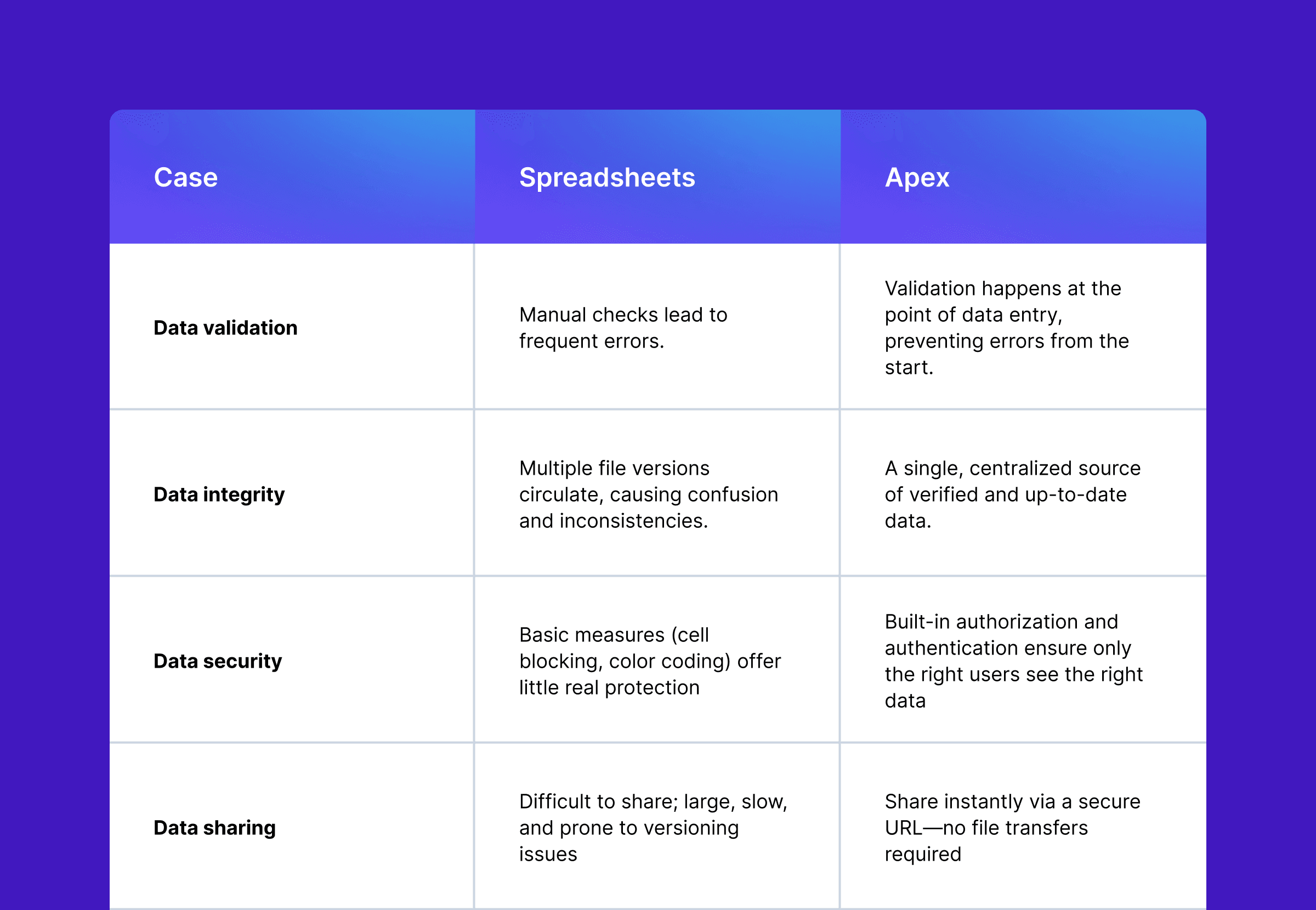Oracle APEX: Enterprise-grade Application DevelopmentLearn more
How Your Business Can Leverage Oracle Apex: Features, Benefits, and Pricing

Oracle APEX is a trusted platform that enables enterprises to deliver mission-critical, data-driven applications. If you’re considering whether to invest resources in building applications with APEX, this article will show you what to expect. We’ll cover what the platform is, who it’s best suited for, and the business benefits you can gain—from faster delivery and lower costs to enterprise-grade security and flexibility.
What is Oracle Apex?
Oracle APEX is one of the world’s most widely used low-code platforms for creating enterprise applications. It allows organizations to build scalable, secure systems directly on top of the Oracle Database—without the need for deep knowledge of web programming languages. The platform is designed for enterprises with limited IT capabilities that want to enhance operations and create more business value without sacrificing quality. For enterprise directors, the value is straightforward: you can build custom applications that can boost sales, reduce costs, and automate internal processes. Time-to-market is also much quicker than custom development and you don’t put additional strain on internal IT resources.
Benefits of Oracle APEX
Oracle APEX combines the speed of low-code development with the reliability of an enterprise-grade platform. The result is a solution that helps organizations deliver business applications faster, at lower cost, and with the flexibility to scale as needs evolve. Here are the key benefits:
Quick time-to-market
Oracle claims APEX makes development up to 20 times faster than traditional programming. In practice, we’ve seen projects go from problem identification to first go-live in just a few weeks—sometimes even faster than Oracle’s own estimates. This speed allows companies to respond quickly to market changes without sacrificing software quality.
Cost-effectiveness
APEX is included at no extra cost with the Oracle Database, saving thousands in licensing fees. Development costs are also lower, as small teams can deliver production-ready applications in a matter of days or weeks. For business leaders, that means faster ROI and reduced long-term maintenance costs compared to traditional coding approaches.
Enterprise-grade quality
Applications built in APEX come with enterprise-grade security and compliance features out of the box. This makes the platform a safe choice for industries with strict requirements, such as manufacturing, finance, and healthcare. Businesses can innovate quickly without compromising on governance or data protection.
Low-entry threshold
Because APEX builds directly on Oracle Database, IT teams with SQL skills can quickly learn to develop and maintain applications. It doesn’t require large teams with complex skill sets—often, a single engineer can deliver a working app. This lowers the barrier to entry, reduces reliance on external vendors, and empowers teams to deliver value faster. Still, having an experienced, database-fluent developer is crucial to ensure applications are built to industry standards. With a proper training, in-house teams can create products that cut costs, increase speed, reduce risk, and remain future-proof.
Versatile
From new modules for ERP and CRM systems to reporting dashboards and workflow automation, APEX is flexible enough to support a wide range of business scenarios. Many companies use it to extend existing Oracle systems, creating tailor-made solutions that fill critical gaps. This means IT investments can evolve with business needs, not against them. Get inspired with these 11 use cases from GGS projects and other industry examples.
Spreadsheet replacement
Spreadsheets are often deeply embedded in daily operations, but they usually are a source of risks, inefficiencies, and errors. With APEX, businesses can replace spreadsheet-driven processes with secure, centralized applications—while still retaining the ability to generate files like XLS, CSV, XML, or JSON. This shift improves data accuracy and reduces operational risk.

Integration capabilities
APEX applications integrate natively with the Oracle Database, ensuring high performance and security. They also connect seamlessly with Oracle ERP, E-Business Suite, JD Edwards, and third-party systems through APIs. This enables organizations to unify data across platforms without costly connectors or middleware.
Flexibility & scalability
Unlike generic ERP modules, APEX lets you design applications that precisely match your business processes. These solutions are easy to adjust as your company evolves, while the platform itself is built to scale for enterprise-wide use—even in high-volume environments like manufacturing. As your business grows more complex, APEX adapts with it, supporting advanced logic and new layers of functionality. The platform is designed to build future-proof product, ready to integrate emerging technologies, including AI, so your systems remain relevant over time.
Accessible from anywhere
As web-based applications, APEX solutions are available anytime, anywhere—on desktops, tablets, or smartphones. The modern, responsive and user-friendly interface ensures a consistent user experience across devices, making it easier for employees to work effectively whether they’re in the office, on the factory floor, or in the field.
Implementation
Here’s how an Oracle APEX implementation works in practice—simple, structured, and fast. Having delivered multiple automation projects, we’ve developed a repeatable process that works across industries and consistently delivers ROI and impact.
1. Discovery: Mapping business processes
Our consultants and engineers work closely with your team to map all business processes and identify automation potential. We detect opportunities and help you leverage software to drive business value.
2. Solution Design: Scoping business applications
Based on the Discovery workshop, our consultants define potential solutions to be implemented with Oracle APEX. You receive a detailed roadmap with clear objectives and ROI for each solution, helping you decide which initiatives to pursue.
3. Installation: Setting up the APEX platform and licensing
We manage the entire APEX platform setup and integration with your existing systems, ensuring a fast, smooth, and hassle-free launch. Whether you choose on-premise or cloud deployment, we’ll guide you in selecting the right plan and handle all licensing requirements.
4. Development: End-to-end application delivery
Our engineers develop tailored solutions from the ground up, ensuring full integration with your ERP systems and a seamless experience for end users.
5. Maintenance: Ongoing support and optimization
We continuously monitor application performance and assess its efficiency to ensure a strong return on investment. Our consultants provide ongoing recommendations for improvements and enhancements.
Built-in functionalities
Oracle APEX provides a rich range of functionalities from which we can choose when developing applications. This provides the ability to develop unique solutions, which is a significant advantage over off-the-shelf systems that often offer an excess of redundant elements. APEX functionalities cover eight core areas:
Data and Reporting
Oracle APEX provides powerful tools to turn scattered data into business insight. With Interactive Reports and Faceted Search, users can filter, pivot, sort, and chart information—without developer assistance. Interactive Grid adds a familiar, spreadsheet-like interface for multirow edits, boosting productivity and data accuracy.
Mobile
Mobile capabilities deliver a seamless experience on any device. Responsive design adapts layouts automatically, eliminating the cost of separate mobile apps. Apps can be installed as Progressive Web Apps with offline fallback, enabling deeper OS integration and a more native feel.
User Interface
Universal Theme and a rich library of UI components let you build consistent, modern apps without heavy HTML/CSS/JS. The component set—Cards, Forms, Menus, Tabs, Reports, and more—follows common UI patterns, so teams can assemble practically any business application. APEX also includes 1,100+ bespoke Font APEX icons to clarify actions and improve adoption.
Security
APEX is secure by default, with built-in authentication (cloud IdPs, LDAP), authorization, robust session management, URL checksums, and output escaping to mitigate XSS. Authentication and authorization give full control over who can access the application—and which parts they can use.
Accessibility
APEX helps teams build inclusive business apps. Advisor checks, Theme Roller contrast validation, an Accessibility Guide, and accessible UI components reduce rework and support compliance—so developers can deliver great experiences for users with different abilities and requirements.
Monitoring
Monitoring and logging provide crucial visibility into how applications are used—essential for auditing, troubleshooting, and planning. APEX automatically logs events such as login attempts, page access and render times, calls to remote services, and developer activity, preserving data for later analysis.
Globalization
Many Oracle DB users serve global audiences, making it crucial to scale their products across different markets. APEX supports deploying a single application worldwide, with translation via XLIFF and automatic localization of numbers, dates, time zones, and right-to-left layouts—delivering a consistent experience in every market.
Workflow & process automation
Many Oracle Database users serve global audiences, making it crucial to scale applications across markets. Oracle APEX supports deploying a single application worldwide, with translation via XLIFF and automatic localization of numbers, dates, time zones, and right-to-left layouts—delivering a consistent experience in every market.
Pricing considerations
Unlike other low-code platforms that are typically based on a monthly or annual subscription, Oracle APEX doesn’t require a separate license if you already run Oracle Database. Development and implementation are the primary costs, and scope and complexity drive the budget, timeline, and team size. Here are key cost drivers to consider:
- Number of departments served
- Data volume
- Number of properties
- Number of data sources
- Number of interfaces
- Functionalities required
- System integrations—how many and what kinds of systems
- Workflows and automations
As a rule of thumb, plan for at least one full-time engineer for 2+ months for a first release; simpler pilots may be shorter, and multi-module programs longer. Contact us to estimate your project based on a brief discovery.
What would you build first?
Oracle APEX gives enterprises a fast, secure, and cost-effective way to build applications that fit the business—without stretching IT resources. Its low-code approach, deep Oracle Database integration, and rich feature set shorten time to market, reduce risk, and future-proofs your product for AI-adoption. With a clear implementation path, you can move from concept to go-live in weeks, not months.
Ready to explore APEX for your organization? Contact us to schedule a brief discovery and get a tailored estimate.
